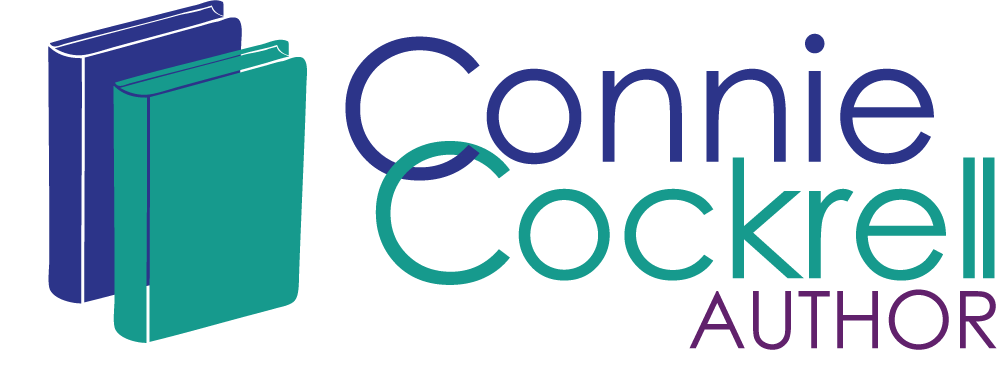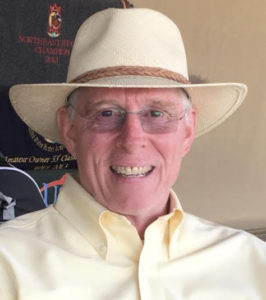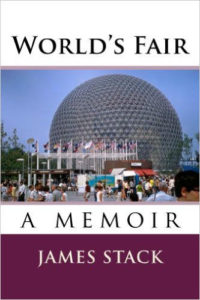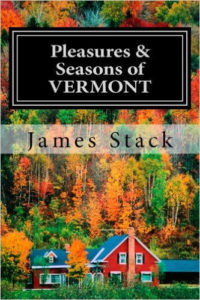I want to give a warm welcome to James Stack, a non-fiction author. James lives in the lovely and gentle state of Vermont and his memoir, WORLD’S FAIR, and collection of poetry, PLEASURES & SEASONS OF VERMONT, were published in 2013. His blog, Postcards From Lebanon, about his experience with chemotherapy, appeared on The Huffington Post during 2013/2014. His poems have appeared in ENGLYN: Journal of Four Line Poetry, the Maine Review (Grand Prize winner), America Is Not the World (Pankhearst Anthology), and Ash & Bones, among others. His short stories have appeared in the Maine Review and Five2One Magazine and been semifinalists in the New Millennium Writings and Cutthroat contests.
We’re so glad to have you here, James.
1. Let’s start with something fun. What’s your favorite hobby?
This is an interesting question. It has caused me to think about what I do that could be considered a hobby since everything I do is fun. After all, the definition of a hobby is: “an activity done regularly in one’s leisure time for pleasure.” At my age, all the episodes of my life are considered leisure time, especially the time during which I write. As such, all that I now do could be considered a hobby. With that said, some things may reside in that niche more than others. I have to say that cooking – the planning, shopping and preparation – would have to be my favorite hobby.
2. If you had the opportunity—who would you like to spend an afternoon with and why?
There isn’t one person who would fit this bill. There are so many. It’s interesting as I think about it. I would have to insist on some requirements. The person would have to be willing to talk to me and be honest. I say this because as I thought about spending the afternoon with my father, he would have been silent and lied as he had in life. All questions would be allowed. There should be nothing off limits, as my mother would have told me, “There are some things you don’t ask in polite society.” There could be no judgmental replies by either party. This is important because time can be wasted on defending topics.
Then it came to me. A mythical bolt of lightening struck. I’d like to spend a sunny, warm, pleasant afternoon with my pre-teen self, after my parents divorced.
I’d love to tell that short, skinny, acne-faced, hormonal boy that not only does life gets better, but I’d want to be convincing since I know what I have in front of me. To encourage the once extrovert in myself that had been cowered to come out of his shell and live life to the fullest so long as we/I do no harm to anyone else. Begin reading everything you/I/we can get our hands on and don’t stop because it will help us be a more knowledgeable and better person/writer. This part of my/our time together should never come across as my preaching to myself, as I know my younger self would never have listened. It would have to be an intimate dialogue where I could share with the pre-teen I had become that there are so many glorious experiences that I/we will have and not to spend so much time worrying about what might have been or will be. Simply know that it will be glorious! I could then put my soul to rest.
3. Coffee, tea, soda or something else?
Tea is my drink of choice during the morning, followed by well water from lunch until dinnertime, during which wine becomes my drink of choice. After dinner it is more water before bed and through the night. My favorite tea is from India – Assam Bop – whose botanical name is Camellia Sinensis. I do not like coffee. In fact, the smell of a fresh pot of coffee makes me ill. I do like the odor of coffee beans, but not the brewed aroma. I used to drink more than my share of diet Pepsi. I will still drink it, but only when traveling or skiing. I allow myself to luxuriate in the treat of a diet Pepsi soda at only those times. I could easily fall off the non-soda wagon and partake once again, but I do fight the urge every day.
4. What are you working on right now?
Funny you should ask. My primary focus is a novel, tentatively entitled The Wycliffe Six. It is a New Adult, coming-of-age, mini mystery that has as its themes friendship, bigotry and betrayal. I’m also working on a series of short stories with my prior Vermont home, Popplewood Farm, as the common theme. I also have several flash fiction pieces in draft form. In reserve I have three collections of poetry hovering around the lower limbs of the maple trees. With that said, I’m hoping to soon begin querying agents about my novel.
5. How would you describe your writing style?
I’m actually glad you asked this question, as I believe it crosses several genres. As such, it is hard to classify. As for how I would describe it, my pen (actually a keyboard) flows from personal experiences. Those that are considered non-fiction are based upon the truth as I lived it. The ones that are fiction have elements of truth mixed in with sensational text to embellish and enhance what I might have experienced or read. I consider myself a realist with a twist. My memoir was from my memory; my novel is expanded realism; my poetry is highlighted life; while my short stories are capable of incorporating fantasy since they may be told from the perspective of a talking bird or ghost.
6. Do you have any advice for a person just beginning their writing career?
I have three pieces of advice for anyone beginning their writing career:
- Read everything on which you can get your hands. The classics are a good place to start. The books that received awards, like the Man Booker International Prize, PEN/Faulkner Award For Fiction, Pulitzer Prize, Nobel Prize in Literature Pushcart Prize and many more. Also incorporate books within your genre. For instance, if you are a romance novelist, you will want to read those that I don’t believe have won any of the awards I’ve mentioned.
- Write at least 500 words every day without editing (editing can be done later). In order to get started, think of them as flash fiction pieces, even if based on a fact of life. Many terrific short stories and novels have come from this exercise.
- Do not fear failure or being declined. This is what others call rejection. It’s part of the life of a writer (also being human). Put yourself out there, starting with having other writers/editors read your work. Look for honest feedback. Failure only makes us stronger and better writers.
7. Do you immerse yourself in new situations for writing ideas or do your ideas come to you through your normal, day-to-day life?
I have to say I do not actively look for writing ideas. My past and day-to-day living have provided so many experiences from which to draw stories. Some are invented and some are based on truth, yet embellished, while still others are drawn from the actual instances in which I breathed. I have traveled extensively, and I have yet to write any stories about the places I’ve visited. I don’t lack for ideas. My struggle is with turning those ideas into a viable story that someone might want to read. My life, to my way of thinking, is not boring; but when I tell a story about it, most times there needs to be a twist or kick to make it interesting to someone else. The truth of the matter is that life is often stranger than fiction.
8. Where can we find you on the interwebs?
I don’t yet have an author webpage, but the following are links to where you can find me or follow me.
http://www.siroliverofskygatefarm.com (blog)
https://www.facebook.com/JamesStackAuthor (facebook)
On twitter @SkygateStack
Pleasures & Seasons of Vermont
Thank you so much, James for being on today’s interview with us. I know I appreciate getting some tips from a non-fiction author.
Readers, check out James’ social media. You’ll be glad you did.



